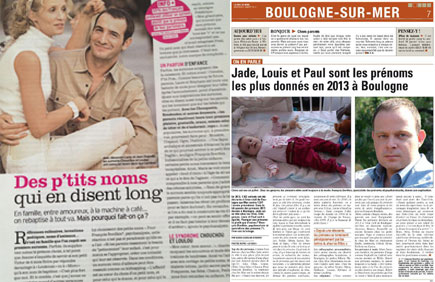To childhood at the adulthood, the first name will undergo several crises. Until the word, it did nothing but hear its first name and react to this one. What imports the word, it is simply enough to name, pre-name in fact. Around 3 years, the child realizes that his first name is also used to him to be different from the others, it will give more and more importance to what defines it socially. Said to a child: "you are a frog", it will answer you "I am not a frog, I am Paul". There does not exist yet for him even but by what names. This attachment is necessary. Dolto told that a three year old child returned for the first time to the school, with the call of his first name and of his name it had not answered. While returning the evening at his place he says to his mother: "mom you know at the school, there is a little boy who is called like me, but today it was not there". Which lapse of memory his/her mother had it makes in the speech with his/her son? Although he knows his names and first names, he did not bring them back yet to his own person.
The example which follows could also find its place in the following chapters. A mother addressed to her child only by calling it "my baby". As soon as its family was in to be provided education for age, him for his name was asked: "I am called my baby H.". The mistress tried in vain to explain to him that it was its name, that its first name it was not "my baby" but Marine, nothing did not make there. She thus convened the mother to explain the situation to him. A few days later, the school, when him for his name was asked, it answered: "my baby Marine H.". The "my baby" was registered so much as denomination for the child whom it considered his first name only in appendix. The situation was nevertheless solved until the day when the mother met a man (it lived alone with her daughter). She also called her companion by "my baby". The small Navy then made crisis by explaining to his/her mother that my baby it was it and not the man with whom it shared his life. There was only one "my baby" and it was it. (see also the chapter of the "small-names").
In the first years of schooling, its first name will take a direction. His relationship with the others will be determining. For a little that the first name carries to the joke, nothing will be saved to him. The child will need "to disparage" the first name of the other to fight against his own anguishes related to his catch of identity. He will thus learn how to like or hate his first name, which returns to the type of emotional relation that one maintains and will maintain later with oneself. In certain cases, when this passage meets clashes, the child can manage from there to reproach to his parents the choice of his first name. As if in this refusal one did not recognize oneself in his first name. Error of direction, error of name on the person, as if the first name behaved like a qualifier of the individual. The bad first name on the good person and not the reverse. All the ages, this phenomenon meets, where the used first name is not that of the marital status. One meets as well of the Caroline in the place of Ginette, as of Rachelle in the place of Catherine. Moreover, it seems that this modification meets more among women than at the men. Does one have to see there a revolt of the girl towards his mother, a way of cutting an umbilical cord more choking that another thing? Not to recognize itself in the first name chosen by the parents is equivalent breaking with them, to disavow existing filiation.
With close the phase of latency, at the beginning of adolescence, the first name becomes tool of sexual choice. One érotise the first name of the opposed sex, it "I like this first name" is only makes a derived way of it express his sexual preference for the person to whom one addresses. There will be either the conservation of the school use of the name between buddies, or name by the first name: "you saw Durand this morning" will not have the same range which "you saw Paul this morning".
What's the first question for which it is imperatively necessary to answer in an unconscious or conscious way to allow two people not knowing to be able to continue in a communication exchange? For example when one has is somebody on the telephone, which the first thing which one seeks to know? Without playing riddles longer, it is about the sex of the person. The person to which I address itself, or conversely, is a man or a woman. Did you never feel this embarrassment at the end of the wire when you did not know if it were a man or a woman who spoke to you? In the street, the question does not arise it in a striking way when you cross somebody and that you said yourselves "one would say a girl, one would say a boy..." When a boy looks at a pretty girl of back and that while being turned over this one proves to be that one. The caused embarrassment often leads with the escape or the dislike. Not to know disorder, one needs the response to the sexual identity absolutely.
The human being, in a need for rassurement, must inlassablement answer certain questions in any contact with the other, whether it is animated or inanimate. The sex of the other is the first concerning two individuals, there is in many others. Within a general framework with any thing, an interrogation which is posed systematically is of knowing that this is or who is this. It is necessary to name, turning impossible to circumvent, and when this answer does not come, there is blocking. Science progresses because it manages to name what it does not manage to explain. Let us take the example of the infinite one, which does not have end. It is impossible for the entendement human one to be able to represent it. However because him a name was given, the infinite one, it can exist, this name does not inform more about its representation, but this unimaginable becomes conceivable. Another example, "haspric", at first sight this word does not have any direction, and it is the case indeed, draws two right bars now and another cutting it in right angle and calls that "haspric". We represented something which at the beginning did not exist and ultimately we give him a direction thus. If my drawing does not have a name and that we put the question "which is this?" we would be tempted to answer according to what our knowledge enables us to answer. In other words with what that makes me it think, what that resembles. Now let us draw two right bars, another cutting it and at the end of a bar let us make a very small point. "That this is?", we do not know anything of it, on the other hand we will be able to say that that resembles a "haspric" (I give besides while passing a male kind to my haspric). From the moment when I name, I give direction, I do not know with what my haspric is useful (now I adapt myself it) but I can represent it and in this fields of representation, I can also draw myriade of elements resembling a haspric, since it is enough for me to slightly decline it each time.
Between individuals, an identical situation meets. It arrives one moment when we need to name what we have opposite us to allow a representation to be carried out. It can be a question of the sex, us already saw it, of the first name, the name but without going until there and to reassure the professional, ethnique membership or anything of other is enough. "Which is this?", "it is American" is enough.
A child when it starts to control the word will question you without stop with "say dad it is what that?, that is used for what that?". You know this phase is in general follow-up of eternal "why" of the children. And as soon as the child is in age to write it will ask you without stop how is written such or such thing. Not really to know how the word is written, nor to be able to learn it, integrate it and reproduce it but quite simply to have the proof that there exists indeed as such.
Let's go back with our teenagers, here it is the feeling, the thought which must take direction. The discovery of sexuality at the various first stages freudien of the child are already well forgotten. Around 12 years, the sexual call takes consistency more and more. We evoked the first name like sexual choice.
Later, to call somebody by his first name amounts meaning the degree of "familiarity" which one maintains with him (in France). A form of recognition by affinities as well as use of the vous and the use of the tu. A hierarchy of the relation in the way of naming somebody settles then...







